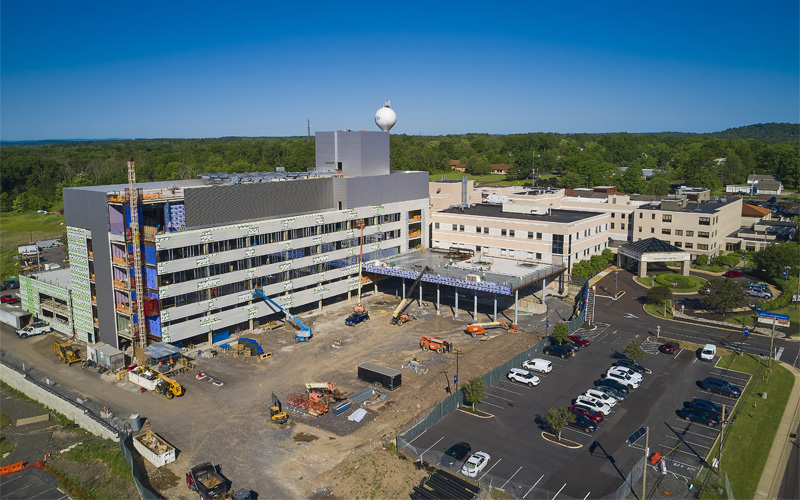
Grand View Hospital will open a new six story pavilion in early July, 2023. Located adjacent to the existing hospital in Sellersville, the new facility will house Grand View’s Level ll Trauma Center and emergency department, 10 new state of the art operating rooms and 52 new private patient “smart rooms” as well as many other amenities.
In August 2018, Penn Medicine and Grand View Health set a vision to develop collaborative services at Grand View Hospital in an effort to provide comprehensive care that kept patients closer to home. Four years later, the relationship is flourishing, with programs in Cancer (including Radiation Oncology), Trauma, Neurosciences, and Orthopaedics. Early this month, the two organizations signed a renewal of their strategic alliance for five more years.
“The world has changed considerably in the four years since the inception of our strategic alliance,” said Douglas Hughes, RN, BSN, MBA, president and CEO at Grand View Health. “Our community is growing, and we are expanding to meet their needs. We’re exploring every avenue possible to ensure we are always ready to deliver the highest quality of care close to home and our alliance with Penn Medicine is one more way we’re making good on that promise.”
Most recently, the two health systems came together through the Penn Trauma Network, earning Grand View Health accreditation as a Level II Trauma Center. Since opening last September, the center has provided trauma care for nearly 700 patients, including 67 who received critical care transportation to Penn via the PennSTAR program.
Other key initiatives and accomplishments of the alliance have included:
- Placement of 58 Penn Medicine physicians on the medical staff at Grand View Hospital, representing about 15 percent of the hospital’s physicians.
- Development of advanced neurological services, including 24/7 telestroke and teleneurology consultations to provide the very best care for patients when minutes count most, which has facilitated nearly 100 telestroke consultations in six-months.
The contract renewal includes terms which strengthen the collaboration, anticipating significant additional program development and extending the timeframe of the engagement into 2027.
“Over the first four years of our alliance with Grand View Health, patients in Bucks and Montgomery counties have had access to the highest level of healthcare right in their own community,” said Kevin B. Mahoney, CEO of the University of Pennsylvania Health System. “In everything we do, the patient is at the center. When it’s a tough case, we want to be able to help them through the specialized expertise available at our Philadelphia campuses, but as much as possible, we’re focused on meeting the patient’s needs and their family’s needs close to where they live. Together, we’re giving patients as many options as possible.”
About Penn Medicine
Penn Medicine is one of the world’s leading academic medical centers, dedicated to the related missions of medical education, biomedical research, and excellence in patient care. Penn Medicine consists of the Raymond and Ruth Perelman School of Medicine at the University of Pennsylvania (founded in 1765 as the nation’s first medical school) and the University of Pennsylvania Health System, which together form a $9.9 billion enterprise.
The Perelman School of Medicine has been ranked among the top medical schools in the United States for more than 20 years, according to U.S. News & World Report’s survey of research-oriented medical schools. The School is consistently among the nation’s top recipients of funding from the National Institutes of Health, with $546 million awarded in the 2021 fiscal year.
The University of Pennsylvania Health System’s patient care facilities include: the Hospital of the University of Pennsylvania and Penn Presbyterian Medical Center—which are recognized as one of the nation’s top “Honor Roll” hospitals by U.S. News & World Report—Chester County Hospital; Lancaster General Health; Penn Medicine Princeton Health; and Pennsylvania Hospital, the nation’s first hospital, founded in 1751. Additional facilities and enterprises include Good Shepherd Penn Partners, Penn Medicine at Home, Lancaster Behavioral Health Hospital, and Princeton House Behavioral Health, among others.
Penn Medicine is powered by a talented and dedicated workforce of more than 47,000 people. The organization also has alliances with top community health systems across both Southeastern Pennsylvania and Southern New Jersey, creating more options for patients no matter where they live.
Penn Medicine is committed to improving lives and health through a variety of community-based programs and activities. In fiscal year 2021, Penn Medicine provided more than $619 million to benefit our community.
